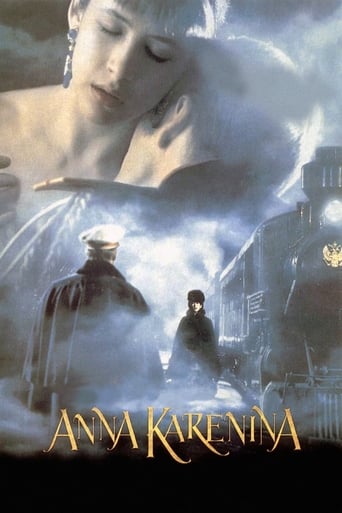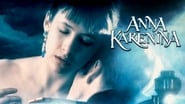TheLittleSongbird
Along with War and Peace, Anna Karenina is one of the greatest Russian novels and one of the greats of 19th century literature, the story is heart-breaking and intense and the characters compelling. Anna Karenina has often been filmed, and of the film versions the 1967 Russian and 1935 Greta Garbo films fare the best and the 2012 Joe Wright-directed version the weakest. This 1997 adaptation from Bernard Rose (Paperhouse, Immortal Beloved, Candyman) has a good amount to like but is one of the weaker adaptations.Visually, the film looks absolutely stunning and along with the 1967 Russian film it is one of the most evocative adaptations period detail-wise. Although some of the editing is choppy, the cinematography is ravishing and the costumes and sets are some of the most beautiful and evocative of any adaptation of Anna Karenina, especially in the opulent ballroom scene and the gorgeous wintry landscapes. The Tchaikovsky-laden music score makes for an aural feast and couldn't have fitted more perfectly.Three performances are good. Coming off best is Alfred Molina, who brings authority and many layers to Levin, wish more was done with developing the character more in terms of writing but at least the film included the character and his subplot with Kitty. James Fox is a ruthlessly cold and haunting Karenin, the character played consistently well in all the Anna Karenina adaptations even in the not-so-good ones. Sean Bean is a handsome Vronsky, but brings a steely intensity to the role that stops the character from being wooden or tragic, rightfully avoiding the dashing heroic figure stereotype.Sophie Marceau however I found miscast as Anna, she looks splendid but is pretty vacuous and lacking in passion. Her chemistry with Bean convinces in the latter and more turbulent parts of the relationship but dull in the early parts. Mia Kirschner is also rather too modern and lightweight for Kitty. This version of Anna Karenina is a visual and aural stunner with a few impressive performances, but is one of the least successful and interesting versions in terms of script and how the story is told.The dialogue doesn't always flow naturally, and feels very dry in tone and with little depth and substance, and the narration was rather unnecessary. Rose's direction shows terrific technical assurance but lacks the same kind of momentum in telling the story. It's the story where the film most falls down, feeling far too short and far too rushed, with about half of the story (or so it feels) being told but all in Cliff Notes version, and it even feels like more of the film was filmed but cut due to studio interference. Neither of the romances are dealt with well, Anna and Vronsky's is too rushed and the very incomplete-feeling one between Levin and Kitty sometimes really slows down the film.Overall, not a bad version but a less than ideal one, as an adaptation and as a film on its own. 5/10 Bethany Cox
sp_rose2005
I do not agree with the earlier reviews that Vivian Leigh played Anna better than Sophy Marceau. It is just that the 1948 version was by itself a better film. The weakness of the 1997 version is that it the scenes are too short and scattered together, and this makes it difficult to express the emotions of the characters and the overall idea behind Tolstoy's novel. But this is the weakness of the movie makers, not the actors. In the 1948 version, the scenes are very detailed and the conversations are long enough to express the idea of each scene. 1948 version is good, but not the best. I don't know if anyone has seen the British miniseries of 2000-2001, but if you want to understand the idea of the book, you should watch it. The cast is not the best, Anna looks old and not suited for this role although she acts perfectly, Vronsky cannot even be compared with Sean Bean, but it's very detailed and just gets deep down to the main core of the novel. It also covers Levin perfectly. The 1997 version pays significant attention to Levin's character as well, but again, because the scenes are too confusing, it will be difficult for those who haven't read the book to understand the true meaning of it. So if the makers of the 1997 version spent a little more time on each scene and included the small details (they make a huge difference), this movie would be absolutely perfect. Other than that, this version is just beautiful with its costumes, music, settings, and cast. It pictures 19th century Russia perfectly unlike any other version before or after it (including the 2000 version).
Nessa
This was surprisingly good. I'm not that much a fan of the Romance genre, if truth be told, but I'll make an exception for this one. The film is carefully crafted. Every emotion, every dialogue enhanced the overall tone of the film, slowly but surely escalating in its momentum up to its tragic climax.Sophie Marceau was brilliant. As was Sean Bean. I wasn't quite sure if they would be able to possess the kind of chemistry needed to pull this off, if truth be told, considering how they (in my opinion) seem to be of different temperament artistically (Sophie being more sensitive as seen in Braveheart and Marquis, while Bean is more explosive). Nevertheless, it worked out fine although, ironically, their relationship seem to be more believable whenever they fell out of odds with each other. :)
Ruby Liang (ruby_fff)
Like "Ivansxtc" 2002 (also based on a Leo Tolstoy novel, and featured Wagner's "Tristan und Isolde"), writer-director Bernard Rose optimizes classical music compositions with thoughtful imageries on screen vs. literal dialogs in his 1997 "Anna Karenina," produced by Warner Bros. and Icon Productions (Mel Gibson affiliated). Sophie Marceau is Anna. Take a close watch at her nuanced facial expressions towards the seemingly 'interminable' end - a remarkable four-minutes worth. Of course, director Rose has everything to do with the visually creative presentation. This version of "Anna Karenina" could be one of the more positive of endings. Yes, it ends not with the usual ending by the train tracks. Bernard Rose the screenwriter gives us enhanced perspectives - there is the parallel story of Levin and Kitty beyond the famous couple of Anna and Vronsky. The story is told from the point of view of Alfred Molina's Levin - we hear his voice-over comments now and then throughout the film. Molina gave a remarkable subdued performance, a rather quiet one compared to his explosive, high energy manic characters in other films. Sean Bean is Vronsky. Mia Kirshner is Kitty. Danny Huston, who's the brilliant main focus in "Ivansxtc", plays Anna's brother, Stiva - friend to Levin and brother-in-law to Kitty. James Fox is the husband, Karenin, and briefly, Fiona Shaw as Lydia, influencing Karenin and becoming the 'unspoken threat' to Anna.The film was authentically shot "entirely on location at St. Petersburg and Moscow." Several Tchaikovsky pieces featured were performed by the St. Petersburg Philharmonic Orchestra, conducted by Sir Georg Solti (Symphony No. 6 in B Minor, Op. 74 - Pathetique; Eugene Onegin; Violin Concerto in D Major, Op 35; Swan Lake). I have seen the silent B/W version of director Edmund Goulding's 1927 "Love" with Greta Garbo and John Gilbert, and director Clarence Brown's 1935 "Anna Karenina" with Garbo and Frederic March. Somehow I found there's more spark, passion and drama in director Rouben Mamoulian's 1933 "Queen Christina" with Garbo and Gilbert. Perhaps it's about the period of 1880's restrictive Russian society, a more emotionally successful portrayal of love affair is Martin Scorcese's 1993 "Age of Innocence" (Edith Wharton's story of late nineteenth century New York high society) - Michelle Pfeiffer and Daniel Day Lewis (Countess Olenska and Newland Archer) certainly gave a titillating relationship on screen of forbidden romance. For sensitive depiction of angst, pangs and passion of marital infidelity, try Tony Goldwyn's directorial debut "A Walk on the Moon" (1999) with Diane Lane as Pearl the wife, Viggo Mortensen as Walker Jerome the blouse man, Liev Schreiber as Marty the husband, and an equally poignant performance from Anna Paquin as Alison the teenage daughter growing up during the summer of Woodstock.
If you appreciate Sophie Marceau and costume drama, she gave a refined portrayal of an 1800's governess with a secret/restrained emotion and passion, opposite Stephen Dillane (who's Leonard Woolf opposite Nicole Kidman in "The Hours" 2002) in writer-director William Nicholson's directorial debut "Firelight" (1997).




